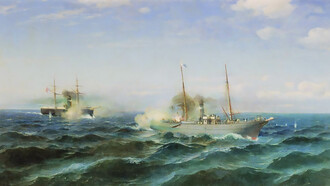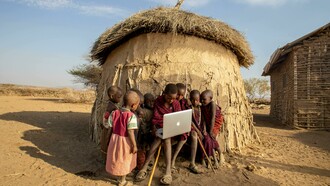One often thinks of events in the past as distant from our current existence, that History is something that happened long ago and far away. On the surface, these events appear to have little relevance to our modern daily lives. In the present developed Global North, we often think we exist at the pinnacle of human development and prosperity, because for many people, the needs for basic housing, food, healthcare, and education are imperfectly but mostly satisfied. Millions of people feel comfortable, superior, and more successful than the so-called primitives humans from centuries ago who came before us. Liberalism, the current dominant social system, is a set of economic and political ideas that define our existence and allow us to pursue leisure time and pleasure, however, both linear and cyclical ideas about time and human history suggest this era cannot last forever. Liberalism will also one day come to an end.
Western notions of time are first and foremost linear and thus feature an alleged beginning while moving forever forward: humanity moves in an onward progression, mastering and controlling the natural world with science and technology influenced by Judeo-Christian teachings and thinkers like Francis Bacon and René Descartes. We have altered the course of rivers, eradicated/mitigated many diseases, cloned animals, and reached out to touch the moon. We enjoy an ever-growing expansion of personal freedoms that has advanced from religious control of behavior and thought to same-sex marriage. Monarchies have given way to democracies as individualism overrides collective interests. In the present of liberal capitalism and so-called freedom, we believe that we live at the apex of human social development.
In the West, political economy is also a process of progression and advancement. The feudalism of the Middle Ages gave way to mercantilism and then liberal capitalism, and the Industrial Age sparked a backlash reaction to labor exploitation with the revolutionary ideas of socialism and communism. Thus, each era of human development had different needs which drove the formulation of new “-isms” to meet the new conditions of the time. These transitions or evolutions can be progressive changes over time or occur in a flash of revolution. We believe ourselves to be superior to our predecessors each time we progress to the next “stage” of human social development.
At the end of the Cold War and the fall of the Berlin Wall, the liberal capitalism of the West and the developed Global North was the apparent winner since that was the supposed end of the ideological battle between the liberal, fascist and communist global frameworks. Progress was to be made through market liberal capitalism. Peace would advance through interdependency and by harmonizing a set of common values. Liberalism going on forever was an idea crystalized by Francis Fukuyama in 1989 through his influential writing, The End of History which became a book in 1992. Today, I suggest his everlasting view of the liberal order was premature.
From here and during the next three decades, we saw the victory laps of the West through the expansion of NATO and many free trade agreements like NAFTA. Deregulation and austerity were the intoxicating drinks of choice during Reagan, Thatcher, and Clinton. The European Union created a new single currency while opening borders. Developing nations like Argentina were required to open their markets through globalist institutions like the International Monetary Fund, and the World Bank. China joined the World Trade Organization in 2001 and implemented a long process of market reforms. US military power went virtually unchallenged through a multitude of ill-fated adventures in the Middle East aided by liberal nation “coalitions of the willing”. The end of the 20th century and the start of the 21st century saw the West, and the developed Global North, particularly the United States, drunk with hegemonic economic and geopolitical power which tarnished its reputation.
A quarter of a century later, the cracks in the liberal order have appeared.
First, the rise of China and the return of Russia to the world stage is setting up for a move to a multi-polar world. The contest of ideas is back featuring the West vs. the Rest. Developing nations throughout the Global South have grown tired and frustrated with the liberal development packages pushed upon them by the U.S, and former colonizers. The resulting market shocks often resulted in reduced social services through privatization, unemployment, migrations, foreign exploitation of resources, and a rise in inequality. Much of the world is now looking for development through the New Development Bank (NDB) of BRICS, an alliance of Brazil, Russia, India, and China outside of the liberal rules-based order where national sovereignty and mutual interests within cooperation hold greater sway than the ideological purity of liberal market forces.
Second, liberal capitalism has been shown to be the cause of a 150-year-long destructive cycle of the world’s biosphere. This is the deregulated pursuit of exploitation of labor and resources for profit using free markets to find “equilibrium”. The celebration of the individual over the whole and the community is now collapsing the global systems due to rapid global warming, severe climate change, pollution, mass extinctions, and a depletion of natural resources. Unsustainable behaviors of endless growth have consequences on a finite planet and, without radical changes, we will soon run out of enough land and water to produce enough food for our populations around 2050.
The same rapid development that brought us so-called wealth and prosperity under liberal capitalism has manufactured our very demise. Global competition is already bringing us conflict in fertile regions like Ukraine The erosion of our quality of life and population decline come next. Studies like The Limits to Growth repeatedly updated suggest that a 75-year decline in GDP into 2100 will begin 2024-2026. Keeping global warming to 1.5C is no longer an attainable target. As of February 2024, we have already reached 1.5C warming above pre-industrial levels for a year now. Many IPCC scientists are now contemplating what a 3C warmed world will look like. Studies like Hanson et al., 2023 suggest a future of 7C-10C warming is possible without immediate action to use aerosols to block the sun and immediate action to remove already emitted carbon dioxide from the air>. The time to act to prevent catastrophe has run out as you read this.
In contrast to the West, many Eastern and indigenous cultures do not think of time or history as linear. Instead, cyclical notions of creation, destruction, and rebirth govern human existence as part of a larger timeless order in harmony with nature, family, and community. This traditional mindset runs deep into philosophical and mythological concepts, such as the Yin and Yang in China, the Mayan calendar, and Shiva, the Hindu god of transformation, and rebirth. Through great destruction comes something new through a process of re-birth. The modern Europe we know today from languages to civil society came from the collapse of the former Roman Empire.
Returning to the West, Karl Marx saw social transformation as driven by a rise of contradictions within a social order which then requires a resolution to resolve the contradictions. Expanding beyond these ideas, today we find ourselves immersed in the contradictions of liberalism where increasing inequality becomes greater than wealth, prosperity results in scarcity, peace results in war, and the unity of shared values can only be liberal values while dismissing the values of others. Even liberal institutions like the International Court of Justice created out of the ashes of World War II to prevent human atrocities find themselves ridiculed by the liberal order itself over Israel and Gaza. Liberalism has become schizophrenic. It has mutated from being a solution into a cause of social disorder.
Next, we have run out of the planet to exploit under liberal capitalism. Others and I may describe the end of the world, but the truth is the world will continue. Many plants and animals will die in the extinctions, and human populations will fall. However, something will survive when the liberal order collapses. Given both the linear Western and cyclical Eastern notions of time, it is foolish to believe liberalism could go on forever. So, what comes next for the world that will remain in ruins?
History informs us that a correction is coming, much like a new Dark Age, where economic upheaval, political turmoil, and death will be rampant. The Post Carbon Institute describes this poly-crisis stage as the Great Unraveling. However, this outlook does not have to be seen as completely negative, as author and archeologist Eric Clark suggests, this is a time when new ideas come forward: in his 2024 book After 1177 B.C.: The Survival of Civilizations he writes about the multiple societies that collapsed at the end of the Bronze Age and transitioned into something new after a period of environmental change, food-chain collapse, political instability, and mass migration. These topics are familiar to us today and how well we cope with them as they unfold will determine how bad it gets.
New models of circular economy and de-growth are promising. Localization and community will need to replace globalization. New ideas and their implementation will be uneven throughout the world. Endless liberal capitalist expansion and development through unsustainable growth will no longer be possible during The Re-Birth. A consensus for the new design of how societies will function may take a century or two to unfold into a New Renaissance. New social needs will drive the emergence and transition to new “-isms” that have yet to be born. This is an exciting and distressing time to be alive as something new will eventually rise from the ashes of our current collapsing political and economic social order. Today, we live at the end of the age of liberal capitalism and the beginning of the next stage of human social transformation.















